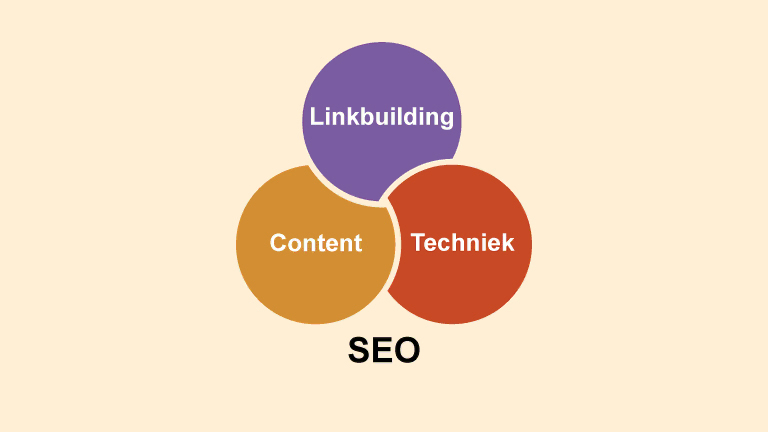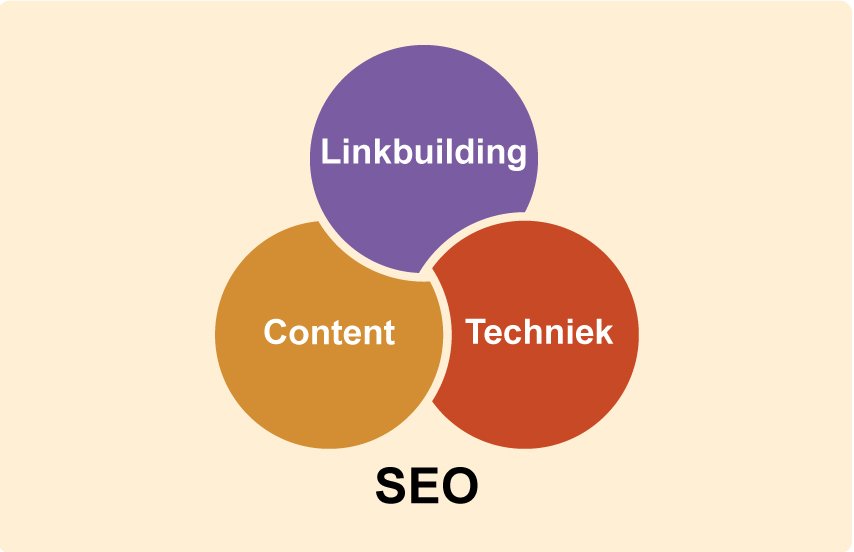SEO advice anno 2025: what are you doing about your search engine optimization?

SEO advice can make the difference between page 1 and page 2 for an organization. In this article, I outline what points within SEO I advise on, what things I apply myself in my processes and how I support organizations during SEO processes.
First of all: SEO advice for SMEs
Do you have a small and medium-sized business with a website? Then invest in SEO. SEO takes your website to a higher level in Google. Getting a high spot in Google’s search results (with the right keywords) is very valuable.
In fact, more than 90% of all Dutch people begin their search for a business in the search engines. If you are currently present in the search engine, you can obtain potential customers to your website. This results in increased conversion, sales and profits.
Dominate unpaid results with the right SEO advice
SEO are the unpaid, organic search results in Google. SEO consists of three components, namely:
- Content: writing relevant, quality text. These texts contain the keywords your target audience is searching for.
- Technology: this includes a fast loading time (no more than a few milliseconds) and a clear website structure.
- Link building: these are links from other websites that point to your website. You gain online authority with this and that is something that is highly valued by Google.

By continually optimizing the above three components, your SMB website will stand a chance of ranking higher in Google. This requires very specific knowledge. For that, you can seek SEO advice for SMEs. This is done at an SEO agency. This is because an SEO agency possesses all the knowledge in the SEO field and also constantly updates its knowledge.
The SEO specialist first does an SEO check for your website. This way he or she will find out where your website currently stands, what the areas for improvement are and where the opportunities for SEO lie. This is where he issues an SEO opinion. An SEO agency can then also carry out the advice: implementation.
Getting started with a
SEO specialist?

Ralf van Veen
SEO Specialist
With 11 years of experience, I improve the organic findability of businesses.
SEO advice to rank higher in Google
Are you an entrepreneur? Then you undoubtedly want a large, organic reach. You achieve this through the use of SEO. SEO requires much, specific knowledge of the subject. After all, it is a complicated field. Would you like to invest in SEO, but you don’t know exactly how or you simply don’t have much time for it? Then get SEO advice on Google from an SEO agency.
An SEO agency understands and knows the algorithms Google uses. This has everything to do with content, technology and authority. By continuously investing in these three pillars, you will eventually end up higher in Google. A higher ranking in Google, in turn, ultimately results in more conversions, sales and profits.
Start with a thorough SEO check
SEO advice for getting higher in Google begins first with an analysis of your website: the SEO check. It examines whether all SEO elements are present and used. It looks at whether the message is clear and whether the keywords are incorporated into the texts in a balanced way.
The second part of the analysis looks at internal and external links. Are these used and do they contribute to increasing page rank? It also includes relevance and quality.
Finally, we look at the technical SEO of your website. What about the loading speed of each, individual page or unnecessary plug-ins?
After this comprehensive analysis, all findings are recorded in a clear report. This report contains advice on how to better optimize your website for Google. You can then implement the advice yourself, or the SEO agency can do it for you.
Use my SEO advice checklist
1. Keyword research:
- Identify relevant keywords that match your website content(1).
- Look at the search volume and competition of these keywords.
- Use long-tail keywords for better conversions.
2. On-Page SEO:
- Make sure your keywords are included in the title, meta description, and headers (H1, H2, etc.) of your pages.
- Make use of alt tags for images with your keywords.
- Provide a clear URL structure that reflects the content of the page(2).
3. Content creation:
- Create relevant and informative content for your visitors(3).
- Use your keywords naturally in the content.
- Update your content regularly.
4. Mobile optimization:
- Make sure your website is mobile-friendly(4).
- Test your website on different devices to make sure it works properly.
5. Site speed:
- Optimize the loading speed of your website. Long load times can drive visitors away.
- Use tools such as Google PageSpeed Insights to see how you are performing and where improvements are needed.

6. Link building:
- Try to get backlinks from high quality and relevant websites(5).
- Use internal links to help visitors navigate your site.
7. Structured data:
- Use structured data (Schema markup) to help search engines better understand your site’s content(6).
8. Social Media:
- Use social media to share your content and increase visibility.
9. SEO in Analytics:
- Monitor your SEO efforts with tools such as Google Analytics and Google Search Console.
- Adjust your strategy based on the insights gained.
10. Local SEO:
- If you have a local business, make sure your information is correct on Google My Business and other relevant directories(7).
This checklist is a good starting point, but SEO is a complex and ever-changing field. It is important to stay abreast of the latest trends and best practices.
Getting started with a
SEO specialist?

Ralf van Veen
SEO Specialist
With 11 years of experience, I improve the organic findability of businesses.
SEO consulting for various organizations
For each collaboration, I am happy to create a customized strategy. Putting out sound SEO advice depends on many variables, so no piece of advice can be the same. Below are the (general) ways in which I advise national organizations and multinationals. The biggest difference here is in the region where a Web site needs to be found.
SEO advice for a national organization
Some of the (generic) SEO advice I would give out to organizations active in the Netherlands.
- Language: it goes without saying that the content of the website should be in Dutch, but it is also important that the language is correct and professional. Errors in spelling, grammar and style can negatively impact the user experience and thus SEO.
- Keywords: do research on the keywords used by your target audience in the Netherlands. Terminology can vary between different regions and cultures, so be sure to identify specific search terms and phrases used in the Netherlands.
- Google.nl: focus on Google.nl because it is the most widely used search engine in the Netherlands. Make sure the website is optimized for this search engine.
- Local SEO: If the organization operates locally, pay special attention to local SEO. This includes things like having a Google My Business page, optimizing for local keywords and asking for local reviews.
- Mobile optimization: with the rise of mobile Internet usage, it is essential to ensure that the website is mobile-friendly. Google has a mobile-first index, which means the mobile version of your website is now more important to Google’s indexing and ranking.
- Technical SEO: This includes things like fast load times, proper use of meta tags, optimizing images, and having a good sitemap. Technical problems can negatively affect a website’s ranking, so it is important to check these aspects.
- Link building: getting backlinks from other reliable websites in the Netherlands can help increase the authority of the website. Focus on getting quality links rather than simply increasing the number of links.
- Content strategy: it is important to create valuable, relevant and engaging content for the intended audience. Not only does this help attract and retain traffic, but it can also help the website appear higher in search results.
- Legislation: consider local and European legislation around digital privacy (such as the AVG), and make sure the website is in compliance with these rules.
- Competitive analysis: analyze the SEO strategies of key competitors. This can help you understand what strategies work in your market, and where there are opportunities for improvement.
Every organization is unique, so it is important to develop a customized SEO strategy that takes into account the organization’s specific needs and goals.
SEO advice for a multinational company
Multinationals also do SEO. See my instructions below for this. In practice, these are relatively complex trajectories, keep this in mind when optimizing.
1. International SEO:
- Make use of hreflang tags to help Google understand what language you are using on a specific page. This helps Google show the right content to the right users.
- Consider using a URL structure that makes it easy for Google to identify different country and language versions of your site. This can be based on subdomains (e.g. nl.website.com for the Netherlands), subdirectories (e.g. website.com/nl/ for the Netherlands), or ccTLDs (e.g. website.nl for the Netherlands).

2. Local keyword research:
- Do keyword research for each country in which you operate. The popularity and relevance of keywords may vary by region.
3. Local link building:
- Build links from local, relevant websites. This can help Google understand your website’s relevance to a specific geographic location.
4. Local content:
- Create content specific to each country in which you operate. This may relate to local events, trends or cultural references.
5. Local optimization:
- Use Google My Business and other local business directories to register your business in each country in which you operate.
6. Technical SEO:
- Make sure every version of your website loads quickly, is mobile-friendly, and contains no technical errors.
7. Use of a Content Delivery Network (CDN):
- A CDN can help improve the load time of your Web site for users in different geographic locations.
8. Compliance with local laws and regulations:
- Make sure you comply with local privacy laws, such as GDPR in the European Union.
9. Monitoring and reporting:
- Monitor your SEO performance in each country individually and adjust your strategy based on the results.
Managing an SEO journey for a multinational company can be complex, so it may make sense to consider working with a specialized agency or having an in-house team dedicated to this area.
Getting started with a
SEO specialist?

Ralf van Veen
SEO Specialist
With 11 years of experience, I improve the organic findability of businesses.
What is important when working with an SEO consultant?
Starting and maintaining a partnership with an SEO consultant is always for the long term. Working consistently with SEO is the only way to win it from the competition. Below are some of the things I value within such a collaboration.
| Priority | Item | Explanation |
|---|---|---|
| 1 | Open Communication | Open communication is crucial in any collaboration. The SEO consultant should be clear and transparent about the strategies and techniques they use, and they should also be willing to listen to input and feedback from the organization. |
| 2 | Realistic Expectations | SEO is a process that takes time, and it can take several months to see results. The consultant should set realistic expectations about what SEO can accomplish and how long it may take to see results. |
| 3 | Knowledge and Experience | The SEO consultant must have demonstrable knowledge and experience in SEO. This may be evidenced by previous success stories, certifications, and the quality of their analysis and strategy. |
| 4 | Understanding the Business | The consultant must have a thorough understanding of the organization’s business, including its target audience, the products or services it offers, and its overall business objectives. This understanding is essential to developing an effective SEO strategy. |
| 5 | Ethics and Integrity | The consultant should follow ethical SEO practices and not try to manipulate search engines with black-hat techniques. This is important not only for the organization’s reputation, but also to avoid penalties from search engines. |
| 6 | Measurable Results | The consultant should be able to measure and report the results of their SEO efforts. This includes things like tracking rankings, analyzing website traffic, and measuring conversion rates. |
| 7 | Flexibility | SEO is a rapidly changing field and the consultant must be flexible and able to adjust their strategy based on changes in search engine algorithms, industry trends, and organizational needs. |
| 8 | Value for money | SEO advice can vary in price, and the most expensive option is not always the best. It is important to consider cost in relation to quality of service and potential ROI. |
Conclusion
Seeking SEO advice is important to rise in Google as efficiently as possible (with the least cost). The important thing to remember here is that this will not yield the same results as working fully with a specialist or outsourcing the SEO.
In doing so, it is important to consider the above issues when partnering with an SEO consultant. Good luck!
- https://developers.google.com/search/docs/fundamentals/seo-starter-guide
- https://developers.google.com/search/docs/crawling-indexing/url-structure
- https://developers.google.com/search/docs/fundamentals/creating-helpful-content
- https://developers.google.com/search/docs/crawling-indexing/mobile/mobile-sites-mobile-first-indexing
- https://developers.google.com/search/docs/crawling-indexing/links-crawlable#external-links
- https://developers.google.com/search/docs/appearance/structured-data/intro-structured-data
- https://developers.google.com/search/docs/appearance/structured-data/local-business






